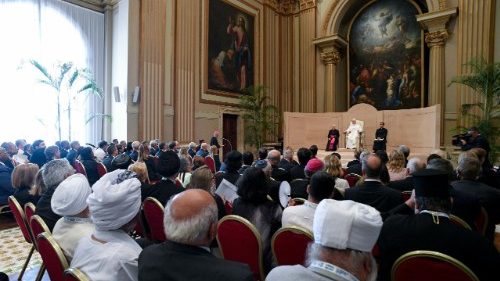
During the Jubilee of Governments, Pope Leo XIV meets with legislators from various nations and recalls the importance of natural law, entrusting them to St. Thomas More, whose “readiness to sacrifice his life rather than betray the truth makes him a martyr for freedom and for the primacy of conscience.”
“The courage St. Thomas More showed by his readiness to sacrifice his life rather than betray the truth makes him, also for us today, a martyr for freedom and for the primacy of conscience.”

Pope Leo XIV made this observation about the 16th-century English saint and former Lord High Chancellor of Great Britain when addressing members of the International Inter-Parliamentary Union in the context of the Jubilee for Governments taking place this weekend in the Vatican.
Greeting the members of the delegations coming from 68 different countries, Pope Leo said politics has rightly been defined as “the highest form of charity.”

“If we consider the service that political life renders to society and to the common good,” he said, “it can truly be seen as an act of Christian love, which is never simply a theory, but always a concrete sign and witness of God’s constant concern for the good of our human family.”
In this regard, Pope Leo XIV delineated three considerations that he said he deems important in the current cultural context.

Pope Leo XIV addresses participants in the Jubilee of Governments (@Vatican Media)
Promoting and protecting the good of the community
“
“The first,” he noted, “concerns your responsibility to promote and protect, independent of any special interest, the good of the community, particularly by defending the vulnerable and the marginalized.” He added that this would include, for example, “working to overcome the unacceptable disproportion between the immense wealth concentrated in the hands of a few and the world’s poor.”
“Those who live in extreme conditions cry out to make their voices heard, and often find no ears willing to hear their plea,” he decried, observing, “This imbalance generates situations of persistent injustice, which readily lead to violence and, sooner or later, to the tragedy of war.”
“Sound politics, on the other hand, by promoting the equitable distribution of resources,” the Pope explained, “can offer an effective service to harmony and peace both domestically and internationally.”
Religious freedom and interreligious dialogue
Pope Leo XIV’s second reflection concerned religious freedom and interreligious dialogue, an area which he said has taken on greater significance in the present time.
Political life, the Pope insisted, “can achieve much by encouraging the conditions for there to be authentic religious freedom and that a respectful and constructive encounter between different religious communities may develop.”
“Belief in God, with the positive values that derive from it,” he added, “is an immense source of goodness and truth for the lives of individuals and communities.”

Pope Leo XIV addresses participants in the Jubilee of Governments (@Vatican Media)
Natural law as essential reference point
“In order to have a shared point of reference in political activity, and not exclude a priori any consideration of the transcendent in decision-making processes,” Pope Leo said, “it would be helpful to seek an element that unites everyone. To this end, an essential reference point is the natural law, written not by human hands, but acknowledged as valid in all times and places, and finding its most plausible and convincing argument in nature itself.”
“Natural law, which is universally valid apart from and above other more debatable beliefs,” the Pope continued, “constitutes the compass by which to take our bearings in legislating and acting, particularly on the delicate and pressing ethical issues that, today more than in the past, regard personal life and privacy.”
The Holy Father also pointed to the Universal Declaration of Human Rights, approved and proclaimed by the United Nations on 10 December 1948, as part of humanity’s cultural heritage.
“That text, which is always relevant,” he underscored, “can contribute greatly to placing the human person, in his or her inviolable integrity, at the foundation of the quest for truth, thus restoring dignity to those who do not feel respected in their inmost being and in the dictates of their conscience.”

Pope Leo XIV addresses participants in the Jubilee of Governments (@Vatican Media)
The challenge of artificial intelligence
The Pope turned to what he called the “major challenge” of artificial intelligence.
“This is a development that will certainly be of great help to society, provided that its employment does not undermine the identity and dignity of the human person and his or her fundamental freedoms,” he said.
Credit: Vatican News
